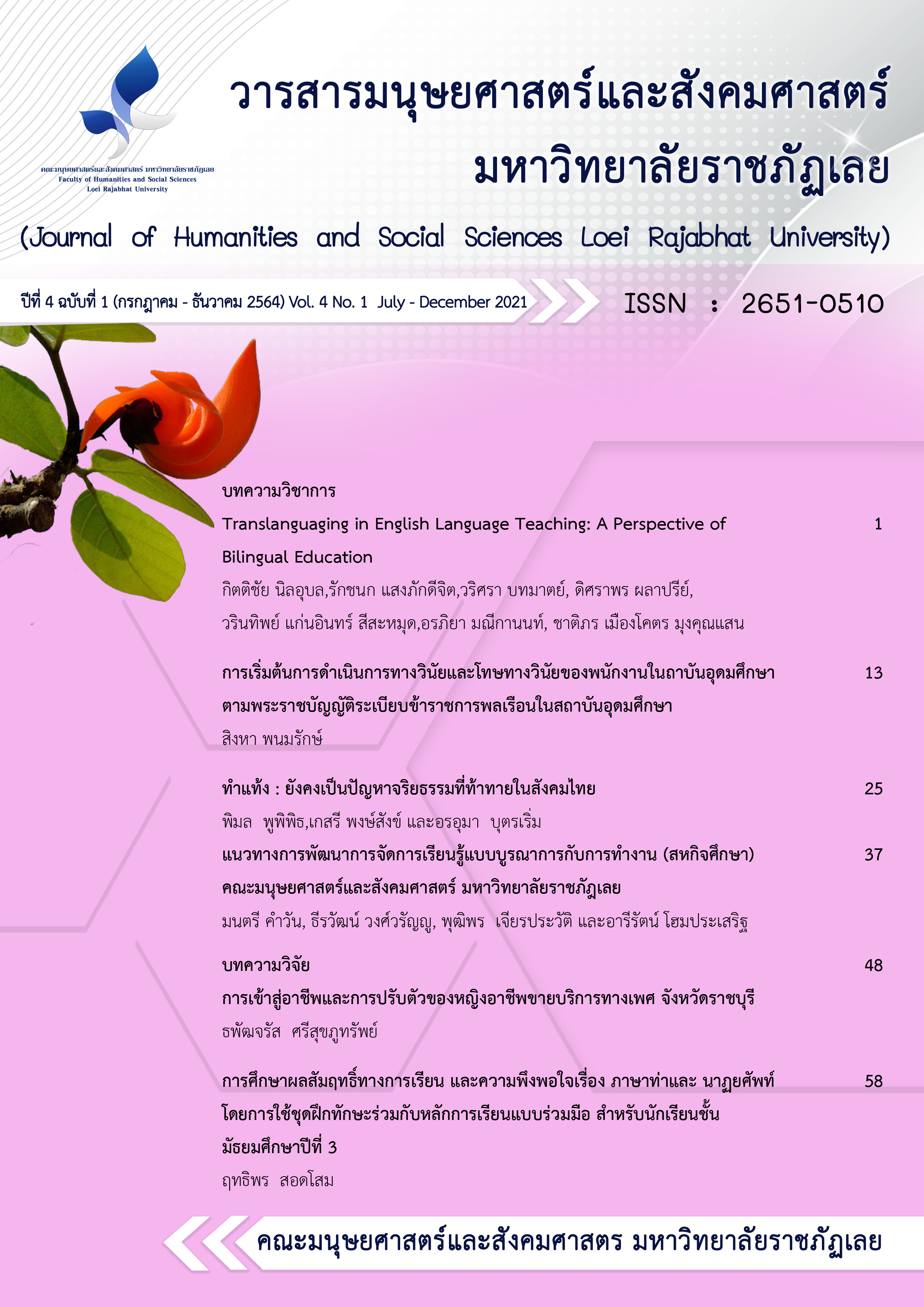Development Guidelines of Cooperative and Work-Integrated Education for the Faculty of Humanities and Social Sciences, Loei Rajabhat University
Keywords:
Learning and teaching management based on Cooperative and Work-Integrated Education, cooperative Education, Faculty of Humanities and social sciences, Loei Rajabhat University.Abstract
Cooperative Education is an essential system for educational management. In present, it is emphasized on learning and teaching management in schools along with authentic experience in workplaces systematically with cooptation from related sectors which is an education system that integrates learning with working or Cooperative and Work-Integrated Education: CWIE). In addition; it is also a form of engagement between educational institutes and workplaces.
The faculty of Humanities and Social Sciences, Loei Rajabhat University recognizes the importance of generating manpower at higher education level with the mission to produce the graduates, research to create innovations to develop the body of knowledge, to offer community service, to inherit local wisdom, and to maintain cultural arts. All missions focus on the development of human and society to be filled with strength, quality, and ability to compete in accordance with Thai Qualifications Framework for Higher Education (TQF: HEd). Consequently, it needs to find out development guidelines of Cooperative and Work-Integrated Education in terms of competency development for students of Cooperative and Work-Integrated Education in workplaces as stated in Thai Qualification Framework for Higher Education (TQF), the development of cooperation with network of workplace network (both government and private workplaces) , and the development of the form of the Cooperative and Work-Integrated Education supervision to create the guidelines to develop the cooperative and Work-Integrated Education to be effective and appropriate for the context of education management in the current situation.
References
จิตราพร ลีละวัฒน์. (2559). การพัฒนาบัณฑิตให้เป็นมืออาชีพ กรณีศึกษามหาวิทยาลัยศรีปทุม. Veridian E-Journal, Silpakorn University ฉบับภาษาไทย สาขามนุษยศาสตร์ สังคมศาสตร์ และศิลปะ, 9(1). 486-487.
ปรีชา พินชุนศรี. (2558). ระบบการจัดการสหกิจศึกษาในสถาบันอุดมศึกษา Co-Operative Management System in Higher Education Instution. วารสารมหาวิทยาลัยคริสเตียน, 21(1), 13.
พาทิศ คงโสมา. (2555). “สหกิจศึกษากับการพัฒนาคุณภาพบัณฑิตไทย Cooperative Education and Development of Thai Students’ Quality กองส่งเสริมวิชาการและงานทะเบียน สำนักงานอธิการบดี มหาวิทยาลัยนครพนม”. วารสารมหาวิทยาลัยนครพนม, 2(3).
วิไลลักษณ์ขาวสะอาด. (2561) ประสิทธิผลของสหกิจศึกษา : กรณีศึกษา อุดมศึกษาไทย. วารสาร มจร สังคมศาสตร์ปริทรรศน์. ปีที่ 7 ฉบับที่ 3 (2561).
อินทิรา มีอินทร์เกิด. (2562). การบูรณาการการจัดการสหกิจศึกษาเพื่อสร้างบัณฑิตเชิงผู้ประกอบการ Integrated Approach of Cooperative Education Management to Develop Entrepreneurial Graduates. กรุงเทพมหานคร: ดุษฎีนิพนธ์ สาขาวิชาการจัดการ บัณฑิตวิทยาลัย, มหาวิทยาลัยสยาม.
Downloads
Published
Versions
- 2023-07-26 (3)
- 2023-02-25 (2)
- 2022-06-30 (1)









